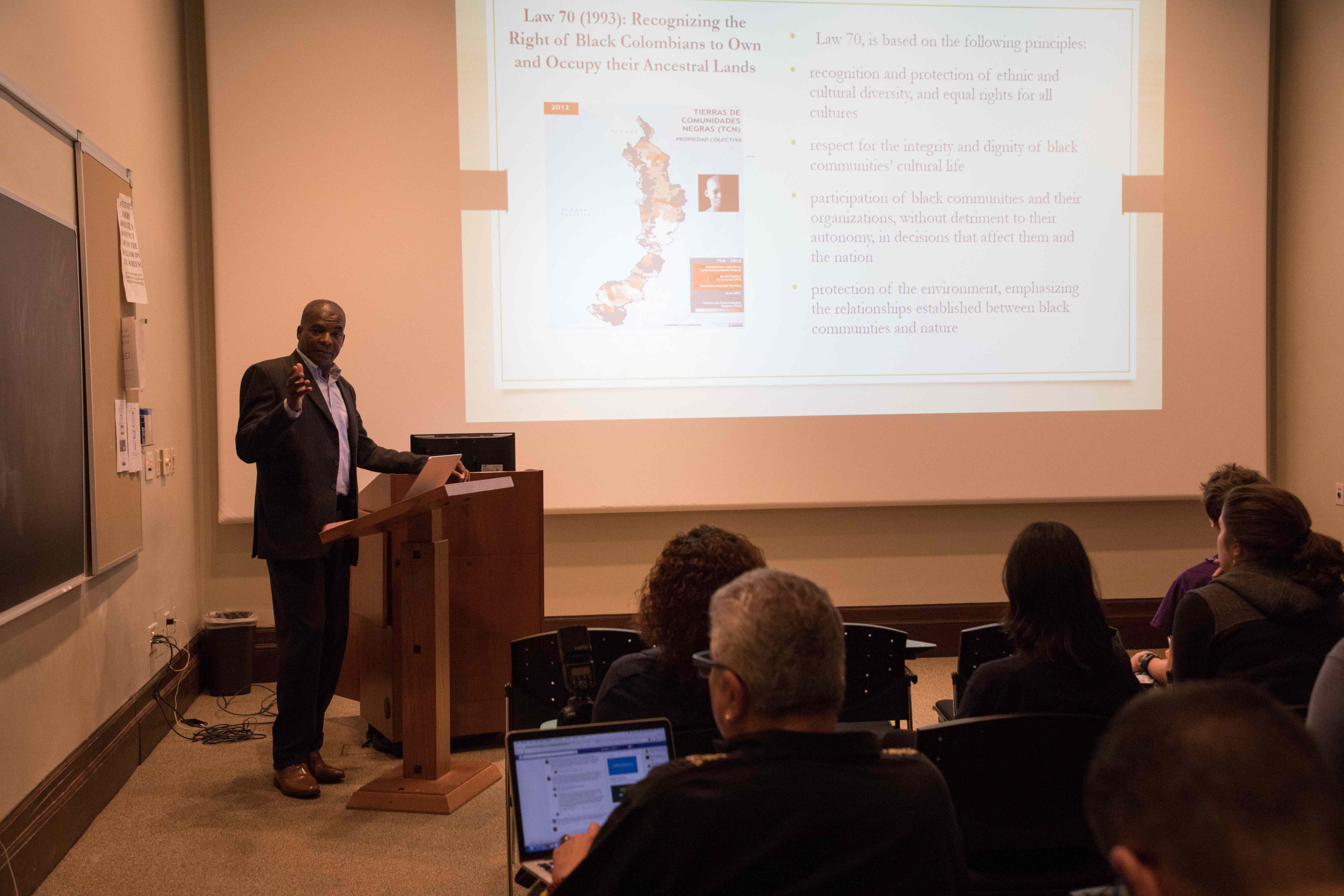

Marino Cordoba and Gimena Sánchez-Garzoli gave a presentation called “Peace and Human Rights for Afro-Colombian and Indigenous Peoples in Colombia” on Friday, Feb. 24 in Fayerweather Hall. Cordoba is an Afro-Colombian advocate for the Association for Internally Displaced Afro-Colombians (AFRODES), and Sánchez works for the Washington Office on Latin America (WOLA), which researches and advocates for human rights in the Americas. The Political Science department sponsored the lecture.
The lecture began with a short documentary called “The Silent Scream,” which showed the persecution of Afro-Colombians from 1996 to the present by the Colombian government. Attacks on Afro-Colombians began in 1996, three years after Law 70 was passed, which recognized Afro-Colombians’ right to occupy and own their “ancestral land” by rivers in the Pacific Basin. Paramilitary and Colombian Army soldiers entered Cordoba’s town when people were sleeping and murdered those who had been involved in passing the law, according to the documentary. They first attacked the town in 1996, and Cordoba has not been able to return home since, instead leading a speaking tour in the U.S. to draw public attention to the attacks.
Congressman Jim McGovern from Massachusetts’ second district, who had previously traveled to Colombia with Sánchez, introduced the two speakers. He condemned the United States’ past policies in Colombia and warned that the current Congress might cause more violence by refusing to support the peace accords between Revolutionary Armed Forces of Colombia (FARC) and the Colombian government that were signed last November. McGovern encouraged the audience to ask representatives to support the peace accords.
Cordoba then described his campaign to protect the Afro-Colombian community with a chapter in the recent peace accords. During the war, paramilitary groups used brutal methods to force Afro-Colombians out of the Pacific Basin. Neither the FARC nor the Colombian government allowed Afro-Colombians to join the peace accord negotiations, Cordoba said. Cordoba toured the United States to speak about attacks on Afro-Colombians. He wrote a letter to President Obama, and was invited to a hearing with the president and Congress.
After working with both the Democratic and Republican parties, Cordoba said, he was invited to Havana, where the negotiations were taking place, to present documents that would protect Afro-Colombians. As a result, the text of the final accords included a chapter which recognized the persecution of the Afro-Colombians “as a product of colonialism, slavery, marginalization and dispossession from their land, territory and resources,” confirmed that they still had titles to their land and gave “full access to their human and collective rights.”
Sánchez then explained the recent improvement in U.S.-Colombia relations. She described her early years working to advocate for displaced persons. Her own family, she said, had been displaced during Argentina’s civil war, and fled to Europe, and then the United States. Congress had in previous years allowed bombing of various villages in Colombia, she said. According to Sánchez, Afro-Colombians lived in areas with valuable natural resources such as oil, and the government and paramilitary forces both wanted this land.
In order to stand up to the Colombian government, Afro-Colombian groups formed the Afro-Colombian Peace Council (CONPA) and later joined with indigenous advocates to form the Organization of Indigenous Persons (ONIC).
“This peace agreement, if you’re looking at it from the U.S. point of view, isn’t just something that’s good to do for Colombia,” Sánchez said. The U.S. has already invested so much in Colombia, she said, and supporting the peace agreement would demonstrate that Democrats and Republicans could work together.
Colombia, Sánchez said, is more secure than ever, but it still needs to bring the National Liberation Army (ELN) insurgent armed group on board with the peace agreement. Other armed groups must also be disarmed, she added.
“Colombia’s not just Pablo Escobar and Netflix,” she said. “Colombia’s not just Sofia Vergara or Shakira. Colombia is a complex country that has some really wonderful amazing people, like Marino [Cordoba], I think more of those amazing people than any country I’ve worked on, that are giving their all to make the country a better place and to make it a peaceful society.”
The two then answered questions, speaking on the dangers of paramilitaries paid by Colombian elites and voter turnout for the referendum on the peace accords.
David Lander ’17, who attended the talk, said that he appreciated a multifaceted perspective on the peace agreement. “When people think of the Colombian peace accords right now with FARC, you only think of the two actors — of FARC and Colombia — and maybe the third actor of the U.S., but you don’t think about the smaller sections within the peace accord that are going to be able to help different communities within Colombia,” he said.
“It’s not just about FARC, not just about the upper echelons of the government,” he added. “You also are going to need [a] medium to incorporate the communities that have been most brutally affected by the war for 50 years. So it’s really helpful to have a talk about this and actually be able to learn about more than just the basics of the conflict.”